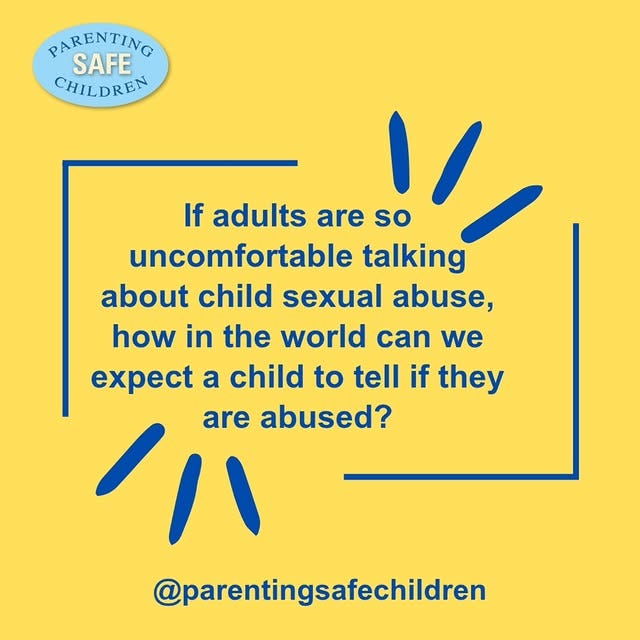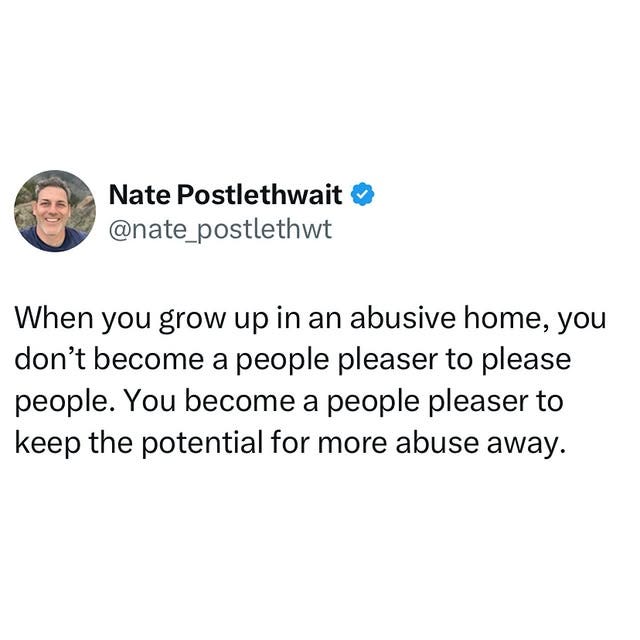
When I started this newsletter on Substack, I didn’t give the name much thought, and I honestly think it showed. “Child Abuse and Mental Health Information” attempted to describe everything covered in the newsletter, but it doesn’t exactly roll off the tongue.
I considered some different names, but ultimately, I returned to the beginning. In 2001, I started a website and purchased the domain childabusesurvivor.net because that’s what I wanted to convey. Here is someone who survived child abuse. You are not alone in this world in having had that experience, and I want one place on the internet where you can see someone else who’s been through it.
Thank you for reading the Child Abuse and Mental Health Survivors newsletter. Each week, I share new blog posts and other resources that aim to help survivors of childhood abuse and those who are struggling with mental health issues feel less alone as we discuss the issues surrounding our issues.
For more information about me and why this newsletter exists, visit the website - Child Abuse Survivor.
A lot has changed, but that core mission has not. I’m still one survivor sending my words, and the links I think might help others dealing with healing from abuse, dealing with mental health issues, and feeling unsafe.
I want to create a safe place on the internet and in your inbox where you are not alone. So, this newsletter is just me saying that I see you and want to share what I learn.
I am a Child Abuse Survivor, and this is my space, so the name reflects that. I hope it can help you feel a little less alone as we navigate this world.
New from the Blogs
Social Media is Not What It Promised to Be - a History
Those platforms are no longer about connecting people and generating community. They are about generating outrage and attention. That's pretty much all they are. And yet, my mission sticks in my head. Do I want there to be one account, one page, that lets an abuse survivor know that they are not alone? I do, but I give up trying to build a community. I don't think it's worth my time. It's also not good for my mental health.
Review - Madness: Race and Insanity in a Jim Crow Asylum
What the two books together taught me is how our justice system has continuously created crimes and punishments meant to hide away problems and how mental health issues become criminal issues when they involve people of color and lower social castes. As we have discussed many times, there are far too many people in the US who need mental health treatment. Far too many of them live in poverty and with cultural trauma that is contributing to their mental health issues, and yet we seem determined to house them in a place that only makes it worse.
Sharing - It’s Also Okay Not to Talk About Your Mental Health
In an ideal world, anyone dealing with mental health struggles could find a safe place to discuss them and find others dealing with similar issues openly. We do not live in an ideal world, so it's OK if you can't talk about it, too.
Sharing - Why resilience won’t solve the mental health crisis among young people
We cannot teach kids to be more resilient and do nothing to minimize the amount of trauma they are dealing with every day.
Sharing - Though not their purpose, some economic and social policies can help prevent suicide
It turns out that our environment contributes to the mental health crisis, and improving that environment lessens the suicide risk. If the goal is to prevent suicide, then we need to be looking at the world we create around people.
Shared from Elsewhere
To follow up on some of the blog links this week, there is also this interview - Q&A: Hamilton author on the 'shocking' lack of understanding about the impacts of racism on mental health.
I don’t know. Maybe give yourself a break and be patient. Becoming a Better Person Takes Time.
Speaking of communities and connections: - 5 Essential Tips to Find Connection in a Lonely World. Also, a reminder about the community in the wake of the horrible fires in Los Angeles - How connection and community help us heal after trauma.
Do you have a favorite? - 21 of the best podcasts for mental health
Let’s hear your mental health podcast suggestions
As mentioned above, social media had promise due to things like this, but it’s no longer this - Social media may have played a role in decreasing the stigma of mental illness.
This Is How Better Boundaries Will Make You Happier
I would probably struggle to explain the difference between panic attacks and panic disorder; luckily, someone else already has - Panic Disorder: Minimizing Fear, Tolerating Symptoms, and Building Skills.
Making a Difference:
Savannah woman brings hope and help with new Maternal Mental Health app
New Order have released a ‘Blue Monday’ t-shirt to support mental health charity CALM
General Hospital's Kate Mansi Introduces Her New Mental Health Show
Buffalo Police Officer shares mental health struggles, now spreading awareness
Nebraska filmmakers work to highlight issues surrounding veterans' mental health
From the Archives
The hard work is in looking at people who are different from us, who live different lives, make different choices, and recognize our common humanity. That's what Dr. King was talking about. Not being blind to our differences but being aware that we are all human and deserve respect based on that. So when a black man is lynched, or a prisoner dies from a lack of medical care, or someone struggling dies from suicide without access to mental healthcare, or because their own family won't accept them for who they are, we fail as a society. We fail to see human life as human life.
How Shame Keeps Us Disconnected
The context for this quote is a handful of stories where someone felt ashamed of an event or something that they'd allowed people to believe about them that wasn't true. Marisa goes on to talk about how when we have something we won't discuss, it creates a separation from other people, and that separation can take away from humanness. Our interactions with other people are blocked off. We know we aren't sharing our whole selves with the people we should be. That block can protect us from potential pain but also prevents us from having all the benefits of having close relationships with other humans.
Sharing - Being Kind to Yourself
I know this is a struggle for me. I notice every mistake I make. I dwell on them much longer than is healthy. When I do something well, even to the point of getting complimented? I forget it relatively quickly.
Thanks for reading. If you find this newsletter informative and helpful, spread the word. That’s the best way to say thank you for my weekly effort.


